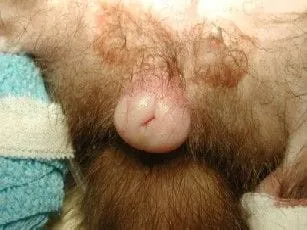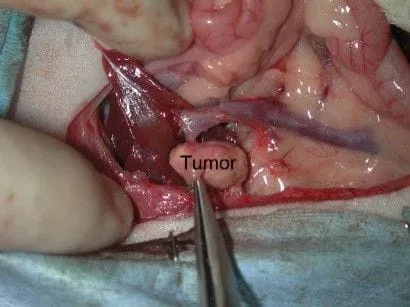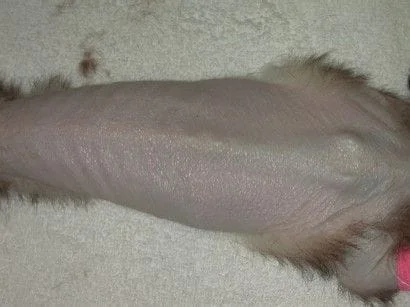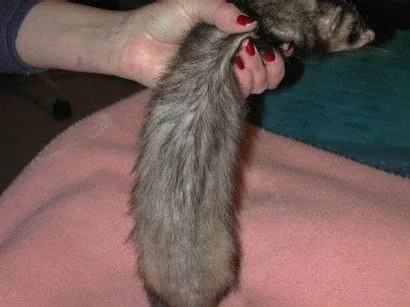Key Points
It is believed that neutering ferrets at a very young age or altered daylight exposure causes adrenal tumors to form later in life
In many cases, the diagnosis of adrenal tumor is obvious:hair loss and/or swelling of the vulva
Blood testing can be done to diagnose adrenal tumors in ferrets
Ferrets with adrenal tumors should receive some form of treatment; this is NOT JUST A COSMETIC DISEASE
Surgical removal of the tumor was the treatment of choice, but Lupron is a medication that can also be used to control clinical signs of the tumor
Anatomy and physiology
Ferrets, as do other mammals, have left and right adrenal glands that are located near the left and right kidneys. The right adrenal gland is located under the great vein in the abdomen called the vena cava, which makes removal of this gland challenging.
- The adrenal glands normally produce
- adrenalin – this hormone prepares the animals for flight or fight in a time of undue stress; the feeling that goes through your body when you get nervous or frightened and the racing of one’s heart is due to this hormone
- glucocorticoids – this is a steroid hormone that helps the body to deal with stress in general; this hormone affects many of the cells in the body
- mineralicorticoids – this is a hormone that controls the amount of sodium and potassium that are eliminated by the body; if the animal has insufficient levels of this hormone the potassium level becomes abnormally high and the sodium become abnormally low, which can cause death
- sex hormones – are produced in very low levels by the adrenals in normal animals
Cause of clinical signs
- It is believed that neutering ferrets at a very young age may be the cause of adrenal tumors to form later in life.
- The sex gland cells found in the adrenal glands begin to multiply and produce hormones
- in males, the adrenal tumors frequently produce testosterone, but may produce estrogen
- in females, the adrenal frequently produce estrogen, but may produce testosterone
- elevation of progesterone, testosterone, and estrogen may be present at the same time
- The clinical signs are related to elevation of these hormones
- Another theory is that indoor housing of ferrets results in a greater exposure to light (versus those in the wild) which stimulates more release of luteinizing hormone from the pituitary gland and increased gonadotropin hormone release from the pituitary gland. The result of this hormone imbalance is excess secretion of estrogen in females and testosterone in males.
Clinical signs of adrenal gland tumors
- Common to both males and female ferrets
- itchiness
- aggressiveness
- decreased appetite
- weight loss
- pale gums due to anemia
- hair loss
- Common to males
- difficulty urinating – related to cyst formation in or around the prostate gland, which compresses the outlet of urine from the bladder
- Common to females
- enlarged vulva (folds of skin that form the entrance to the vagina) – see photo below

Diagnosis
- In many cases the diagnosis of adrenal tumor is obvious with the clinical signs of the dramatic hair loss and swelling of the vulva
- Blood testing should be done to help rule out other concurrent diseases such as insulinoma
- Blood testing can be done to look for elevated estrogen, progesterone, or testosterone levels
- we send our samples to the University of Tennessee for testing
Surgery
- During the surgery all of the internal organs are examined for problems
- The affected adrenal is removed
- Some sources claim that the left is most commonly affected, however I in my experience about 50% of the ferrets have right-sided tumors and some have tumors on both the left and right adrenal glands
- Below is a photograph of a right adrenal gland removal; this tumor is fairly large and has been freed from the vena cava and is only attached to the vein of the adrenal gland

Expectations
- Resumption of appetite and weight gain
- Urinary obstruction resolves in male ferrets
- Hair regrowth takes a couple of months – below is a photo of the bald ferret before surgery and the other after surgery


Alternative treatment
- Ferrets with adrenal tumors should receive some form of treatment; this is NOT JUST A COSMETIC DISEASE (loss of hair)
- Surgery should always be the first treatment
- If surgery is not an option, a medication called Lupron can be administered
- The disadvantage of this medication is that it is very expensive


